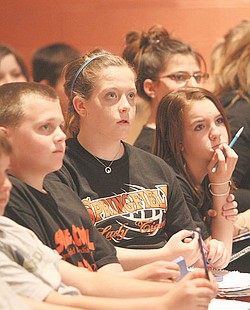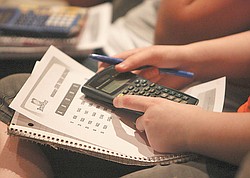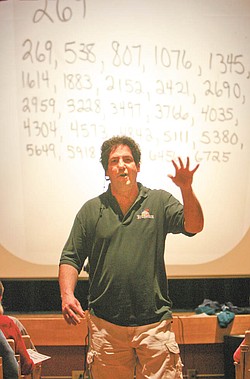Mind over math
Springfi eld Intermediate seventh-graders, from left, Tyler Caradona, Rachel Crowe, Jocelyn Benzenhoefer and McKenzie Brown (partially hidden) listen intently as Mike Byster teaches them methods to improving their memory and academic performance. The students got the chance to put what they learned into practice as Byster put them to the test with some memory and math exercises.
Mike Byster, a retired commodities trader from Chicago, came to Springfield Intermediate School on Thursday to teach students math and memory tricks that they can use to improve their academic performance and that will aid them throughout their lives. Byster, known nationally as a “mathemagician,” offers the program without charge.
Mike Byster, a retired commodities trader from Chicago, came to Springfield Intermediate School on Thursday to teach students math and memory tricks that they can use to improve their academic performance and that will aid them throughout their lives. Byster, known nationally as a “mathemagician,” offers the program without charge.
Mathemagician shows Springfield students memory tricks
By HAROLD GWIN
NEW MIDDLETOWN
Mike Byster said he wasn’t born with the ability to do complex mathematical problems in his head.
“That’s something you’re not born with; it’s something you have to teach yourself,” he told a group of about 200 seventh- and eighth-grade students Thursday at Springfield Intermediate School.
Byster, a retired commodities trader from Chicago, was in town to teach students math and memory tricks they can use to improve their academic performance and use throughout their lives.
“I want to show kids what they can do,” he said, adding that he presents his program at 250 to 300 schools each year free of charge. As a proponent of parental involvement, he asks the schools to invite parents to his programs.
He addresses students at a rapid-fire pace, explaining that he does that intentionally to keep them focused and their brains working during the presentation. They have to pay attention to keep up with what he is saying.
It seems to work.
He gets their attention by first solving a series of increasingly difficult math problems in his head, then teaches them how to do the same thing.
Creating a sentence, song or even a story using words or the first letters of words on a list you need to memorize can help you recall those items later, he said, putting his audience to the test by reciting a list of 10 items and then asking them to write down the ones they remembered.
The students averaged between five and six items.
When he put those same words in a story he told later in the program, the recall average was nearly nine out of 10.
Mary Ritter, a seventh-grader, said she was impressed.
“He showed us a new way to learn things,” she said.
Callie Ford, also in seventh grade, likewise was awed by what Byster could do.
She said she especially liked the memory tricks he taught them and said she found the whole experience worthwhile.
Byster, who has appeared on the “Today Show,” “60 Minutes” and “20/20,” is the creator of Brainetics, described as a revolutionary system that uses mathematics to teach you how to use two parts of your brain at the same time. One part processes information while the other part stores information, allowing the mind to work better and faster at all subjects.
 43
43



